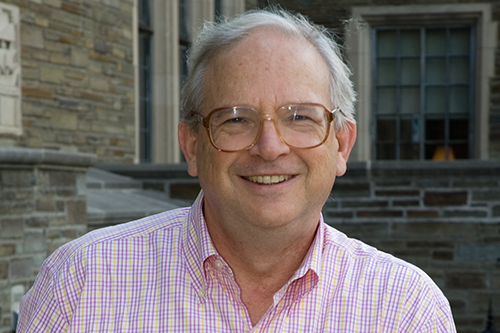This website uses cookies
We use cookies to ensure that we give you the best experience on our website. If you continue to use this site we will assume that you are happy with it.

Ted Eisenberg.
Cornell Law School mourns the death of Theodore Eisenberg, the Henry Allen Mark Professor of Law and Adjunct Professor of Statistical Sciences, who died February 23 at the age of 66 from a heart attack. Known as the “grandfather of empirical legal studies,” Eisenberg was a passionate teacher, beloved colleague, and prolific scholar during his 33 years at the Law School.
A legendary figure in the areas of bankruptcy, civil rights, and the death penalty, Eisenberg has used innovative statistical methodology to shed light on such diverse subjects as punitive damages, victim impact evidence, capital juries, bias for and against litigants, and chances of success on appeal. He is the founder of the Journal of Empirical Legal Studies and a Fellow of the American Academy of Arts and Sciences. Eisenberg taught courses on bankruptcy and debtor-creditor law, constitutional law, civil rights, contracts, federal income taxation, and empirical studies of the legal system.
“Ted was a giant in the legal academy and one of the pioneers of modern empirical legal studies,” says Stewart J. Schwab, the Allan R. Tessler Dean and Professor of Law. “He had high standards and a generous spirit. His energy was astounding as he traveled the country and the world, participating in conferences and teaching others how to be better empirical scholars.”
After earning a B.A. from Swarthmore College in 1969 and a J.D. from the University of Pennsylvania Law School in 1972, Eisenberg clerked for both the District of Columbia Circuit of the U.S. Court of Appeals, and Chief Justice Earl Warren of the U.S. Supreme Court. After three years in private practice at Debevoise & Plimpton in New York City, Eisenberg began teaching at UCLA in 1977. He joined Cornell Law School as a permanent professor in 1981.
It was in his second year at Cornell that Eisenberg became deeply interested in empirical legal research. From that point on, his work in that area was prodigious; he authored or coauthored over 125 scholarly articles and wrote or edited over 20 books or chapters in books. In addition to visiting professorships at Haifa University, Harvard, Stanford, Turin, and Tel Aviv, Eisenberg was recognized with numerous fellowships, grants, and awards. He also served on over 25 editorial boards and outside committees and served as an expert witness at a number of high-profile trials.
Eisenberg explained his approach to empirical research in a spring 2008 article in the Cornell Law Forum magazine. “I like to let the data tell their own story, not try to superimpose one,” he said. “As in any good scholarship, you check your assumptions. If you don’t have the real facts, people will make them up or follow the headlines.”
“For me personally, Ted was a dear friend and our families are close,” says Schwab. “The suddenness of his death is shocking and the sadness is profound. Cornell Law School has been lucky to have had his intellectual leadership, creativity, and energy for more than three decades. I wish it could have been longer.”
Eisenberg is survived by his wife Lisa, three children, Kate, a doctor in Rochester; Annie, a 2012 graduate of Cornell Law School now clerking in St. Louis; and Tommy, a Ph.D. student in economics at Cornell; and two grandchildren.
A memorial service was held at the Law School on Saturday, March 15. Hundreds of family members, colleagues, friends, and students paid tribute to his life and career.
Memorial contributions can be made to:
Eisenberg Memorial Fund
Cornell Law School Development Office
260 Myron Taylor Hall
524 College Avenue,
Ithaca, NY 14853